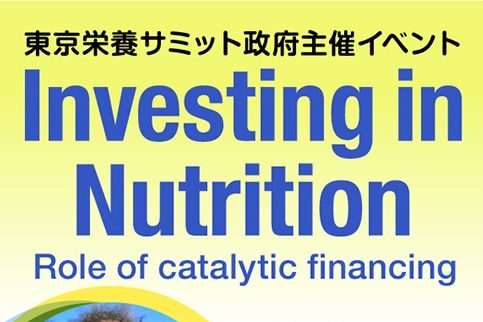The Japan Center for International Exchange (JCIE), joined by the Ministry of Finance of Japan, the World Bank, and the *Global Finance Facility for Women, Children, and Adolescents (GFF), held an official Nutrition for Growth 2021 Summit event: “Investing in Nutrition—The Role of Catalytic Financing.”
Nutrition is key to achieve universal health coverage (UHC) and build human capital, and renewed commitment to nutrition financing will be needed to reach this goal. Building on the long-standing partnership between Japan and the World Bank on advancing nutrition, the meeting focused on how to secure financing for nutrition and how to mainstream nutrition financing in UHC strategies, including as part of pandemic preparedness, and response. Speakers shed light on the roles of catalytic financing to prioritize nutrition in national development agendas, enhance delivery of nutrition services through health systems and engage stakeholders in the policy dialogue and program implementation by highlighting country initiatives in the field of nutrition. This event was part of JCIE’s program on Building Understanding of and Support for the Global Financing Facility.
AGENDA
Moderator

AKIO OKAWARA
President & Chief Executive Officer, JCIE
Opening remarks

KEIZO TAKEMI
Member of the House of Chancellors
JCIE Senior Fellow

MARI PANGESTU
Managing Director of Development Policy and Partnerships, World Bank
Panel discussion

MARTIEN VAN NIEUWKOOP
Global Director for the Agriculture and Food Global Practice, World Bank

JUAN PABLO URIBE
Global Director for Health, Nutrition & Population and GFF Director, World Bank

SUPRAYOGA HADI
Deputy of Policy Support for Human Development and Equality, the Office of Vice President, Indonesia

NADINE UMUTONI GATSINZI
Director-General of National Child Development Agency, Rwanda

TADASHI SATO
Vice president, Japan International Cooperation Agency (JICA)

MATY DIA WANDELER
CSO representative, GFF Investors Group; Partnership Manager for the Global Financing Facility Civil Society Hub, PAI(Population Action International)
Closing remarks

ATSUSHI MIMURA
Director-General of International Bureau, Ministry of Finance, Japan
Akio Okawara, president and CEO of JCIE/Japan, opened the event, noting JCIE’s long-standing efforts to support and promote global health and health security. The opening remarks were then offered by Keizo Takemi, member of Japan’s House of Councillors and JCIE senior fellow, who spoke of Japan’s experience and history with building up nutrition after World War II, explaining how Japan conducted health-related surveys to inform the implementation of multiple nutrition and growth-monitoring services and interventions around the country. He also described Japan’s role in bringing about more discussions on the promotion and integration of universal health care (UHC) into the Sustainable Development Goals (SDGs), as well as the catalytic financing of UHC through the G20 meeting and UN High-Level Meeting on UHC in 2019.
Next, Mari Pangestu, managing director of development policy and partnerships at the WB, provided valuable insight on the state of nutrition worldwide. Pangestu spoke about the trillions of dollars lost annually in productivity due to nutrition issues, and the plight of low- and low-middle-income countries (LMICs) that struggle with both undernutrition and obesity. Without proper nutrition, individuals are more susceptible to noncommunicable diseases such as diabetes, which make them more susceptible to severe illness from COVID-19. She stressed the importance of long-term partnerships, such as those through the Japan Trust Fund (JTF), WB, and GFF, which will help build nutrition as a priority and build up a long-term solution to improving health.
A panel discussion was then led by Martien van Nieuwkoop, global director for agriculture and food global practice at the WB, who pointed out that over 75 percent of people overweight and obese globally are in LMICs, and that the hidden cost of the global food system—including agricultural and food waste—is estimated at $19 trillion a year. As a result, he stressed the critical importance of partnerships in this area to improve not just nutrition but also health, the world economy, and climate. Juan Pablo Uribe, the director of the GFF and global director for health, nutrition, and population at the WB, presented a video on the importance of investing in a child’s first one thousand days (from pregnancy to their second birthday) to ensure not only their growth and future but also the future of their country by paving the way for sustainable economic growth. Uribe also presented the activities of GFF and JTF, including why investing in nutrition is critical to human capital and productivity, and the value-added from JTF and GFF partnership through country examples. He stressed the need to make a compelling case for nutrition country by country to show the importance of nutrition as an essential health service as well as a component to addressing social determinants of health (SDHs).
Continuing the panel discussion, Suprayoga Hadi, deputy of policy support for human development and equality of the Office of the Vice President of Indonesia, discussed the current status and challenges facing Indonesia in the field of nutrition. Since the launch of its stunting reduction program in 2019, Indonesia has seen improvements in child stunting, but progress has stalled due to the impact of COVID-19. Hadi discussed how catalytic financing from the JTF and the GFF have helped to maintain the delivery of quality nutrition interventions at the community and noted that catalytic financing and the strengthening of multisectoral partnerships can help support the integration of nutrition into public health and mitigate the effects of the pandemic on women and children.
Nadine Umutoni Gatsinzi, director-general of the National Child Development Agency of Rwanda, discussed Rwanda’s 2017 initiative to take a more multisectoral approach to nutrition to help reduce cases of stunting and anemia. Through collaboration with the GFF, WB, and JTF, they developed a 5-year strategic plan on nutrition, with high-impact interventions and concrete targets to achieve results, which serves as their Investment Case (IC). Similarly, a partnership with the GFF, WB, and the Japan International Cooperation Agency (JICA) has enabled Rwanda not only to scale up innovations but also to share more information.
Representing JICA, Vice President Tadashi Sato presented their ten-point commitment to address nutrition as a part of the goal of ensuring human security. Sato stressed that, when promoting UHC, organizations and governments need to understand that UHC includes the improvement of maternal and child nutrition and the establishment of healthy diets. Sato discussed examples of in-country intersectoral and multisectoral collaborative projects with the WB and JTF, as well as with national governments, and suggested ideas for future collaboration to aid in the mission to address and improve nutrition abroad.
Maty Dia Wandeler, a CSO representative in the GFF Investors Group and partnership manager at the GFF Civil Society Hub, PAI, provided a CSO perspective on tackling nutrition issues on the ground. Wandeler discussed how CSOs are well-positioned to understand the priorities and needs of communities, and that through catalytic partnerships with the GFF, CSOs can work across sectors to advocate for increased health financing and contribute to the preparation of ICs, advocating for the integration of nutrition services and ensuring that nutrition indicators are included on all levels.
The panelists answered questions about challenges to integrating nutrition into the budget for rural communities, ways to more effectively address the burden of malnutrition, how improvements in nutrition can reduce climate change, and the interventions and challenges for nutrition-sensitive approaches. In concluding the panel, the moderator noted that nutrition should be a key part of both the WB and individual country agendas, and how it will be important to address nutrition from different angles and across sectors to catalyze change for a healthier people, a healthier economy, and a healthier planet.
In his closing remarks, Atsushi Mimura, director-general of the International Bureau of MOF, thanked the panelists for stressing integrating nutrition into the global health agenda as a critical factor to achieving UHC, and for highlighting the importance of mobilizing resources and strengthening partnerships for mainstreaming nutrition in the national health agenda. Mimura also stressed that, from the MOF perspective, supporting nutrition efforts can enhance pandemic preparedness and response (PPR) by helping ensure healthier people and thereby reducing mortality rates in future pandemics. Mimura spoke of the essential partnership and collaboration between health ministries and financing facilities and their joint responsibility to scale up resources to empower nutrition services. Finally, he announced that the Tokyo Nutrition for Growth Summit reaffirms Japan’s commitment to contribute an additional $50 million to the GFF, and $20 million to JTF, for a total of $70 million from Japan to further catalyze and advance these critical partnerships to address nutrition problems in developing countries to help improve their capacities in creating and implementing sustainable nutrition policies.

